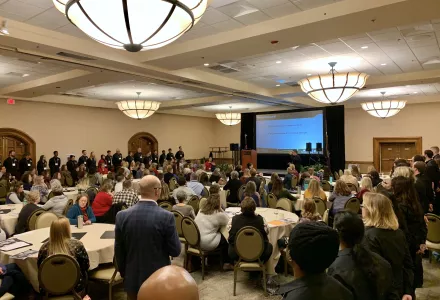
As threats to U.S. elections multiply, the Belfer Center’s Defending Digital Democracy Project (D3P) continues to help election officials fight back. Coordinated by D3P’s Mari Dugas, the Defending Digital Democracy team of staff and students has worked during the year with state and local election officials in their own states across the country to conduct election security tabletop exercises and has also expanded engagement with cybersecurity professionals.
In March, D3P sent a team of students and staff to present at the RSA Conference. Selected from thousands of applicants to make presentations at the conference, the team conducted a training simulation or tabletop exercise (TTX) to help participants learn more about how officials across the U.S. are securing elections. Along with 45,000 other attendees in San Francisco’s Moscone Center, the D3P team also previewed some of the cybersecurity community’s most cutting-edge research.
“Ultimately, all elections are local,” said D3P’s student team leader Jordan D’Amato. “There’s an alignment between the skillsets of cybersecurity professionals and the need to secure elections. So, there are very real and concrete ways that these folks can make a difference in their own communities.”
The team’s emphasis on cross-sector collaboration was echoed by FBI Director Christopher Wray. In his conference keynote, Wray explained that while adversaries continue to surveil election infrastructure and conduct malign foreign influence operations, some of the most positive developments have come from federal engagement with private sector partners.
In April, D3P assisted the Virginia Department of Elections in conducting its first-ever statewide election security tabletop exercise. D3P members Reed Southard and Matthew Podolin served as moderators for the exercise, which pitted nearly 100 local election officials against a fictional but plausible scenario featuring a range of cyber and physical threats to election infrastructure.
The Virginia training followed a similar session in Idaho where team members Matt McCalpin and Gabe Cederberg helped run Idaho’s first statewide election tabletop exercise sponsored by the Office of the Idaho Secretary of State. More than 120 election officials participated in the exercise where they were confronted with worst-case scenarios intended to prepare them for potential threats to the 2020 election.
“The Belfer Center greatly enhanced our ability to put on an exceptional event,” said Chad Houck, Idaho’s Deputy Secretary of State. “We couldn’t have pulled it off without their support and the resources they provided.”
Additional Efforts to Combat Cyber and Disinformation Attacks in the United States and Abroad
Earlier this year, the Defending Digital Democracy Project published a report that describes the propaganda and information operation threats against U.S. democracy and offers 10 recommendations that the public and private sector in the United States can take now to combat information operations.
The National Counter-Information Operations Strategy report is the work of Gabriel Cederberg, Jordan D’Amato, Corinna Fehst, Simon Jones, Kunal Kothari, Aleksandra Milcheva, and Irene Solaiman. It can be accessed at belfercenter.org/CounterInfoOps.
In addition to D3P playbooks for state and local election officials and campaign officials in the United States, it has produced—along with the National Democratic Institute and International Republican Institute—campaign playbooks adapted for use in English-speaking European countries and translated for campaigns in a number of other countries worried about cyber and information attacks on their campaigns.
"D3P Helps States Increase Security for 2020 Elections." Belfer Center Newsletter. Belfer Center for Science and International Affairs, Harvard Kennedy School (Summer 2019).


